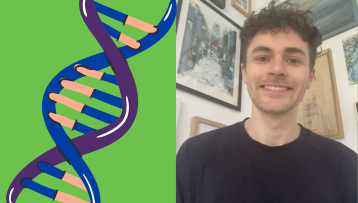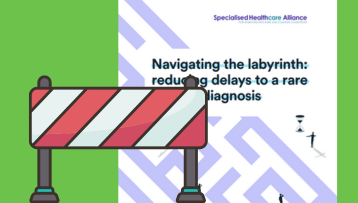This year’s Rare Disease Day focus is research. Today, February 28, patient organisations are
busy highlighting so much of the fantastic research currently being undertaken to better understand a whole range of rare diseases. We are using this
spotlight to share the work of some of those undertaking research into TSC.
The TSA began funding research into TSC in 1980. Since then TSA-funded research has contributed to the identification of the TSC genes, advancements in
DNA testing, and understanding what happens in TSC cells. The contributions we make to research are hugely significant and the TSA is seen as a key
player in this field on a global stage.
Professor Julian Sampson, of Cardiff University’s School of Medicine,
is involved in both research and the delivery of services for people with TSC through the NHS.
‘We are very fortunate at Cardiff University to have a research pipeline that involves work right from the genetic causes of TSC, through cell and tissue
models to try to better understand the disease processes to the development of new treatments through to clinical trials – trials in patients.’ says
Professor Sampson.
‘A lot of the research that we have undertaken has been done in conjunction with other international centres including particularly Rotterdam and Boston.’
Professor Sampson and his team have a joined-up approach to their research, which they describe as ‘from the bench to the living room’.
‘When we are undertaking basic research into TSC we always have in our minds that we want that research and its findings to translate into real benefits
for people with TSC,’ says Professor Sampson.
‘There are a number of steps to get from the bench to the living room, and these involve working with molecules, with cells, with models of the disease
and ultimately with patients and families affected by the condition. And so it is very important for us that we have good links, good understanding
and good communication between the researchers and patients and their families. It’s here that I think the Tuberous Sclerosis Association has done
an absolutely fantastic job of helping to put the research community and the patient and family communities together.’
With 19 research projects ongoing, including those at Cardiff University featured in our video that we are sharing online today on Rare Disease Day,
the TSA’s current #TSCure research portfolio stands at £1.9m.To be funding research at this level is a phenomenal achievement and simply it wouldn’t
be possible for us to do so without the amazing efforts and generosity of our fundraisers and supporters.
‘If I’ve got one message for the TSC community it is that the best, most effective and quickest progress will be made by the TSC researchers and doctors working together with patients and their organisations, with the pharmaceutical industry and with policy makers, and government. All these elements need to work synergistically,’ says Professor Sampson.
‘I think we have made a tremendous amount of progress over the last 25 years, going from having very little understanding of TSC, to now really understanding
its genetic basis and to having some targeted treatments that really do work. But there’s still much more to do, much more to be discovered. In particular
I am very interested to see if we can seize the opportunity to prevent some of the manifestations of TSC by intervening with these drug treatments
earlier. At the moment we only treat people with TSC once the problems become established and quite significant. Increasingly we are finding evidence
that early intervention is going to make things much better by preventing these problems from arising in the first place.’
You can watch our short video for Rare Disease Day featuring research at Cardiff University any time on YouTube at
https://www.youtube.com/watch?v=lPHx8aCDiMM&t=5s
#RareDiseaseDay
And click here for full details of all research funded by the TSA.














































































































